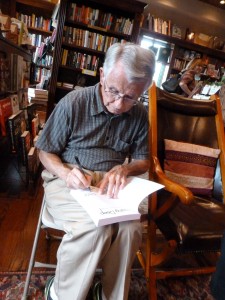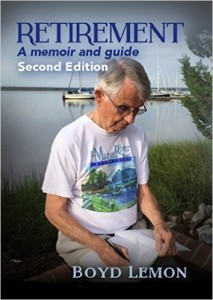Boyd Lemon recently re-released his groundbreaking retirement book “Retirement: A Memoir and Guide” as a second edition. This new edition has been updated and should please many of the people who enjoyed the book the first time around. I wanted to feature a new interview with Mr. Lemon and this is the result… Enjoy!
Why did you want to write a memoir?
Initially, to understand my own flaws, motivations and mistakes in dealing with relationships, especially marriage, to understand my role in the destruction of my marriages––writing as a form of introspection and therapy. After completing several drafts and having it edited, I decided it would be worth publishing because I thought it would help others in facing their own problem relationships.
How long did it take to develop the book?
A total of three years, but I spent a year of that time in a wasted effort to retain an agent to represent me to publishers.
How did you come up with the title?
I looked for phrases in the last chapter of the manuscript that I thought encapsulated the main theme. Then I added a subtitle to clarify what the book was about.
Who are you? Did you learn anything about yourself from writing the book?
A ton. Before you commit to the relationship, most people must discuss in detail the expectations, needs and wants of both of you and make sure that you both are willing to meet those expectations, needs and wants of the other. The most important thing I learned was that in any serious relationship like a marriage, you must give constant attention to your partner and the relationship. You can never take the relationship for granted. You must be tuned in to your partner’s expectations, needs and wants, as well as your own, and discuss them honestly and without recrimination. You must distinguish between love and lust. Talk about problems and issues without making accusations. Express your feelings in a non-accusatory manner. Finally, expect hard times, and roll with the punches.
Why was it important for you to write about your life?
To try to figure out my role in my misery. Before I started writing, I had a vague feeling that it wasn’t somebody else’s fault or plain bad luck. Boy, was I right, but it took a lot of difficult, painful introspection to reach that conclusion and understand my role.
Is there anyone you wrote about that you had to remove from the book?
No. I pretty much let it all hang out. I felt I needed to if I was going to get to the truth, and I concluded it would be less than honest if I held back anything that was relevant.
How did your day job influence your writing?
I was semi-retired when I wrote the book and had the luxury of having plenty of time to write. If I’d had a full time job and a family, it would have taken much longer. I admire writers who can write books while working full time to earn a living. It takes extreme dedication, but it is possible.
What is the most difficult aspect to writing a book?
For me, it is after the first draft when you have to focus on keeping the timeline accurate, the characters acting in character and everything making sense over two or three hundred pages.
Do you think you could write full-time?
I do now, but full time is different for each writer. I have read about a few who write six to ten hours a day––Stephen King and Ray Bradbury come to mind. Most of us cannot sustain it for that long every day. I average (and I emphasize average) no more than three hours a day, and I consider that full time. Of course, if you count the hours I am thinking about the story, the characters, the themes, subplots, etc., it is many more hours than that. I am talking about actual writing time.
How do you feel about the way the book has been received by readers?
I am pleased. I have received many heart-warming letters from readers who told me how much it helped them and praising me for my honesty. That is very rewarding.
******



You must log in to post a comment.